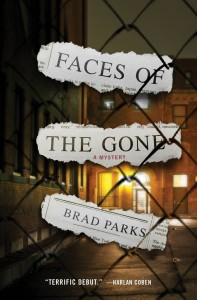 Please join me in Welcoming guest blogger, BRAD PARKS, to the Killzone…though be warned, treacherous waters lie ahead…
Please join me in Welcoming guest blogger, BRAD PARKS, to the Killzone…though be warned, treacherous waters lie ahead…
Editor’s note: In this guest blog post, the author has indicated he will be employing an extended metaphor to explain how he writes. Metaphors are highly complex literary devices and should only be attempted with great care. Ask your doctor if you’re healthy enough to use metaphors. Do not use metaphors if you take nitrates for chest pain. If your metaphor lasts more than four hours, consult an editor immediately, as this could be a sign of rare but serious case of over-writing.
There are a lot of different writing methods out there, and – like a lot of you, I’m sure – I experimented with a number of them through the years. I tried outlining, but found it stifled my spontaneity. I tried starting with the end in mind, but found it made the end too predictable. I tried sketching out key scenes before I began, but found myself too impatient trying to get from once scene to the next. Finally, I found the method that works best for me. I call it, “Writing like an open-water distance swimmer.”
Editor’s note: Wait a tick, isn’t that actually a simile? You used “like” or “as.” That makes it a simile. You must be one of those kids who daydreamed through the section of eighth grade English where you were supposed to learn the difference.
I got into swimming a few years back when my surgically repaired knee kept making it difficult to continue jogging as much as I wanted. I enjoyed swimming, except for one thing: Pools are boring. You swim to the wall. You do a flip turn. You swim back. It’s the equivalent of writing by formula – it’s exercise, sure, but there’s not enough to keep it interesting.Then my wife and I moved to the tidewater part of Virginia, to a small cottage on a wide section of the Rappahannock River, not far from the mouth of the Chesapeake Bay. The climate is fairly mild here, so I’m able to start swimming in April each year and, with the help of a wetsuit, can keep it up until the end of October.
Editor’s note: Yeah, yeah. You’re a freakin’ iron man. Get on with it, will you?
And here’s where, for me, writing is like open water distance swimming: Each day, I know where I’m starting (on the beach just down from our house). And I know I need to get back to dry land eventually. But I don’t know exactly what I’m going to encounter on the way. All I can do is plunge into the water and start stroking. Certainly, there are dangers involved in open water distance swimming. You can get swept away by strong currents. You can suffer a cramp. You can get attacked by a great white shark.
Editor’s Note: Hold on. A great white shark? C’mon. You already said you swim in a tributary of the Chesapeake Freakin’ Bay. Everyone knows great white sharks are ocean-going creatures. More importantly, Wikipedia knows it. Shape up, buster.
You can get stung by a jellyfish.
Editor’s Note: Better.
Yet that sense of danger is what keeps it fun and interesting. Between the tide, the wind and the waves, the river is never quite the same place from one swim to the next. I’ve found writing this way keeps things fresh – every day is a new adventure.
Plus, as a writer, you get the chance to edit what you’ve done and correct your mistakes. It’s the equivalent of going back over your swimming route in a row boat, being able to say, “Oh, that’s where the current got a little strong for me, I should have swum over here instead. That’s where I got attacked by that great white shark…”
Editor’s Note: You’re just testing me now.
“… that’s where I got stung by that jellyfish.”
Editor’s Note: Better. Hey, did you hear about the giant jellyfish that sunk a 10-ton Japanese fishing boat (http://www.telegraph.co.uk/earth/6483758/Japanese-fishing-trawler-sunk-by-giant-jellyfish.html)? Honestly, how embarrassed were those guys when they went back to the dock and had to tell their fishing buddies, “Yeah, the Mary Jane gave it her all, but the jelly was just too much for her!”
And then you go back and fix it. But – and here’s perhaps the most important part of the metaphor – there’s really only one way to get from one side of the river to the other. You have to keep swimming.Unlike jogging, or working out on an elliptical machine or lifting weights, you can’t just stop when you get tired. Once you’ve thrown yourself out there in the river, in water over your head, you’ll drown if you let yourself stop. And maybe there are times when the shore looks like it’s an impossible distance away or you think you won’t be able to make it. The only way to get through it is to keep going, one stroke at a time. And you know from your previous swims – or your previous writing sessions – that if you just keep doing that, you’ll eventually get back to shore, with soft sand under your feet.Do you have a good metaphor for your writing? I’d love to hear it.
Editor’s Note: Just, please, no sharks.
BRAD PARKS is an escaped journalist, having done time at The Washington Post  and The (Newark, N.J.) Star-Ledger as a sportswriter and news feature writer. A graduate of Dartmouth College, he is a washed-up jock, a veteran of community theater and a terrible golfer. He lives in Virginia with an understanding wife and two adorable young children. To learn more about Brad or FACES OF THE GONE, visit http://www.bradparksbooks.com/. You can also sign up for his newsletter (http://www.bradparksbooks.com/fan-club.php), become a fan of Brad Parks Books on Facebook (http://www.facebook.com/pages/Brad-Parks-Books/137190195628#) or follow him on Twitter (www.twitter.com/Brad_Parks).
and The (Newark, N.J.) Star-Ledger as a sportswriter and news feature writer. A graduate of Dartmouth College, he is a washed-up jock, a veteran of community theater and a terrible golfer. He lives in Virginia with an understanding wife and two adorable young children. To learn more about Brad or FACES OF THE GONE, visit http://www.bradparksbooks.com/. You can also sign up for his newsletter (http://www.bradparksbooks.com/fan-club.php), become a fan of Brad Parks Books on Facebook (http://www.facebook.com/pages/Brad-Parks-Books/137190195628#) or follow him on Twitter (www.twitter.com/Brad_Parks).
 and The (Newark, N.J.) Star-Ledger as a sportswriter and news feature writer. A graduate of Dartmouth College, he is a washed-up jock, a veteran of community theater and a terrible golfer. He lives in Virginia with an understanding wife and two adorable young children. To learn more about Brad or FACES OF THE GONE, visit http://www.bradparksbooks.com/. You can also sign up for his newsletter (http://www.bradparksbooks.com/fan-club.php), become a fan of Brad Parks Books on Facebook (http://www.facebook.com/pages/Brad-Parks-Books/137190195628#) or follow him on Twitter (www.twitter.com/Brad_Parks).
and The (Newark, N.J.) Star-Ledger as a sportswriter and news feature writer. A graduate of Dartmouth College, he is a washed-up jock, a veteran of community theater and a terrible golfer. He lives in Virginia with an understanding wife and two adorable young children. To learn more about Brad or FACES OF THE GONE, visit http://www.bradparksbooks.com/. You can also sign up for his newsletter (http://www.bradparksbooks.com/fan-club.php), become a fan of Brad Parks Books on Facebook (http://www.facebook.com/pages/Brad-Parks-Books/137190195628#) or follow him on Twitter (www.twitter.com/Brad_Parks).
Welcome to TKZ Brad. I also just saw you got a great review from Oline Cogdill. The link is http://www.sun-sentinel.com/features/fl-bk-faces-mystery-120609-20091204,0,142400.story
Awesome, post, Brad. Not a strong swimmer myself so I’m in awe. I write the same way, though-this week I need to come up with an ending for my latest book. No idea what’s going to happen yet, although you’ve inspired me. I’m thinking giant jellyfish…
Excellent advice, Brad. Thanks for stopping by TKZ. I’m going to practice my backstroke right now.
Hey Guys — Thanks for having me here.(And thanks, Clare, for posting Oline’s review!)
Michelle — I was just chatting with a top New York thriller editor who was looking for the next great jellyfish read. So you might be onto something…
Great post, Brad. Swim safely–to my mind, jellies are way scarier than sharks.
Being Alaskan, where swimming in ocean or rivers is fun for all of two minutes, till you turn blue and your private parts start clinking like ceramic castanets, the writing like a swimmer metaphor does necessarily work for me.
My writing is more like homebrew with only a minimal recipe and an idea what you want at the end (ie a good tasting beverage and a comfortable buzz). I start with a bunch of ingredients, grind, boil, pour, sift, and soak then wait with the mixture for a couple weeks. Then siphon it out into a clean container to get the biggest of the waste out and then the real thing begins. With a little knowledge, the right temperature for reactivity and some skilled eyeballing and wafting six months to a year later you have a fine wine.
…or at least a dull smile on your face when it comes up at 25% alcohol.
If you’re swimming in the Chesapeake, make sure you don’t get crabs.
“Writing like an open-water distance swimmer.”
Does that mean you put all that grease and ick all over you before you write? Don’t you slide out of the chair?
I love these chats about methods, the ongoing debate between NOPs and OPs (No Outline People and Outline People) and the odd progeny in between. Every method has its benefits and costs. You have to decide which costs you’re willing to bear, and which benefits are best for your style.
And then you have to do a full outline.
Kidding.
Or maybe not.
Basil — A quarter booze, huh? I think if I ever get a co-“writer” I want you to be the guy.
Hey Brad, sharks, jellyfish and what? I was at a conference a couple years ago held at the Hyatt on the inner harbor of Baltimore and loved it, but as I told my friends who lived in Boston, I’m from Michigan where we have a lot of water… and it’s blue, not brown.